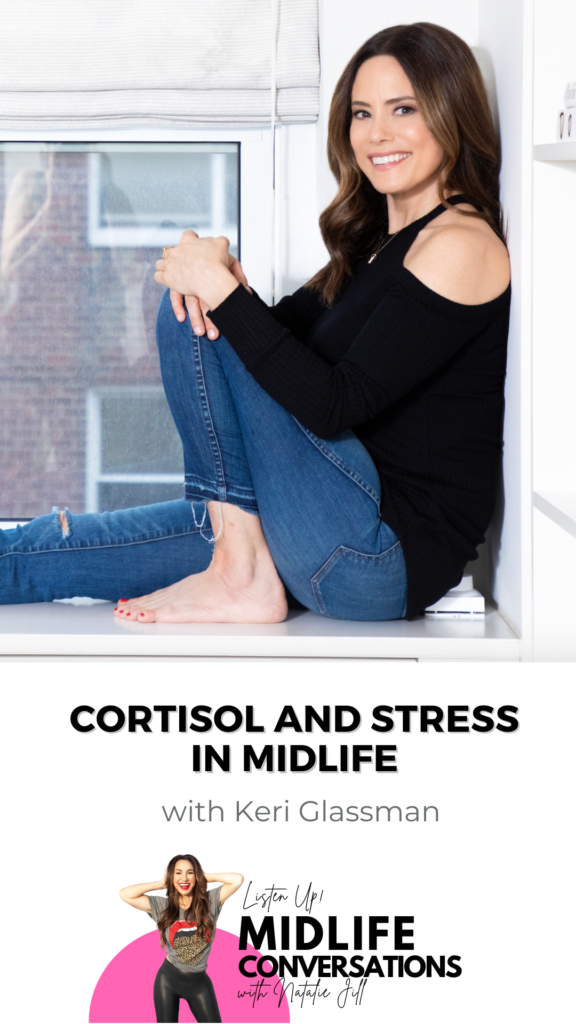Cortisol and Stress in Midlife with Keri Glassman
Keri Glassman is not only one of my closest friends but is a celebrity nutritionist who has helped countless people change their lives! Although she is most known for her nutritional knowledge, today we are talking midlife woman to midlife woman about stress and cortisol and what it can do to our bodies.
Stress has always been an interest to Keri in her practice in terms of being an important pillar of overall health, especially as a naturally high-stress person. However, it’s also one of the most common pillars to go unaddressed.

What Is Cortisol?
Cortisol often gets a really bad wrap as just the bad belly fat stress hormone. BUT…cortisol is NOT a bad thing. Cortisol is actually a good thing…when it’s controlled properly and is doing the job it is supposed to do.
What Does Cortisol Do To Our Bodies?
Cortisol will surge when you are in fight or flight mode, and we want this! Your hypothalamus in your brain signals to the pituitary gland to release a hormone called adrenocorticotropic hormone (ATCH) which signals to our adrenals to release cortisol and adrenaline. Your blood pressure raises, your digestion slows, you breathe faster, you may start sweating, and your liver is mobilizing glucose for energy. This is why in the old school being chased by a bear example (fear or perceived fear) you will feel that rush of energy to get safe!
When you’re producing the right amount at the right times, cortisol can also improve our energy, acts as an anti-inflammatory, helps with memory, helps to manage blood sugar and blood pressure, helps decrease pain, and increases motivation. It also helps with our immune system and brain function.
How Do We Manage Cortisol?
More often than not this day in age people in midlife likely have a cortisol problem – from aging parents, to finances, to teenagers, to business ventures, you name it!
Oftentimes people think that managing cortisol just means they need to “stress less” because their cortisol is high…but what it can also mean is that their cortisol rhythm is out of whack. Cortisol should work opposite from melatonin; it should spike in the morning a couple hours after you wake and will continue to lower throughout the day by the time you sleep – and then will rise again a few hours after waking.
How Do We Know We Might Have A Cortisol Problem?
The signs of having a cortisol problem are actually similar to those symptoms of perimenopause or hormone imbalances:
- Weight gain – specifically in the midsection, as you are mobilizing glucose and have an increase in your hunger hormone
- Brain fog
- Inflammation
- Aches and Pains
- Lowered Immune System
- Stressed/Anxious/Irritable
Because of the overlap in symptoms, people tend to blow it off. To some extent, yes, it’s because you’re aging, BUT that doesn’t mean that you can’t fix it. Whether you think you have a cortisol problem or not, you should be doing the things to help regulate your cortisol.
You can instead MAXIMIZE your health by managing your cortisol.
3 Tips to Managing Cortisol
- Focus on getting good sleep. Get rid of the blue lights, add in magnesium, make sure it’s dark. Make sure you are doing what is necessary for excellent sleep hygiene.
- Let go of the extreme diet and exercise. You might need more walks vs. running, or more yoga vs. cycling. Much less of the HIIT workouts.
- Manage your stress. And commit to doing it. Create a routine you can do every single day – whether it’s 10 minute meditations or 10 minutes in nature, etc. – make sure you’re doing something exclusive that has the sole intention of managing your stress.
And remember…consistency is key. It won’t be an overnight change, but once it works, you will feel the difference.
About Keri Glassman
Keri Glassman, MS, RD, CDN, is a renowned celebrity nutritionist, healthy cooking expert, and wellness thought-leader. She is the founder and CEO of Nutritious Life and the Nutritious Life Studio, an online certification that provides unparalleled, forward-thinking education to individuals of various backgrounds looking to establish successful careers in the health and wellness industry.
Keri is a Today Show Tastemaker and an advisory board member for Women’s Health Magazine. She is the author of four bestselling books, including The New You and Improved Diet and The O2 Diet. She’s also regularly featured on national television programs like The Today Show, Good Morning America, and The Rachael Ray Show and is a prolific contributor and commentator for countless other top media outlets.
On a weekly basis, you might catch her on The Today Show talking protein-rich snacks, on The Doctors explaining sugar cravings, on The Rachael Ray Show sharing recipes, or in the pages of Women’s Health answering readers’ most pressing wellness questions.
In this episode, you will learn:
- The role of stress and cortisol in our bodies
- The concept of a nutritious life and the 8 pillars
- Should you be consuming caffeine
- Why sleep is important for your cortisol levels
- Why stress management is important for cortisol levels
